Evaluating Country Programmes - OECD Online Bookshop
Evaluating Country Programmes - OECD Online Bookshop
Evaluating Country Programmes - OECD Online Bookshop
You also want an ePaper? Increase the reach of your titles
YUMPU automatically turns print PDFs into web optimized ePapers that Google loves.
<strong>Evaluating</strong> <strong>Country</strong> <strong>Programmes</strong><br />
118<br />
environmental sustainability. Activities for which aid had been terminated<br />
provided a clear insight into the main factors responsible by comparing differences<br />
in sustainability among these projects. The potential sustainability<br />
of results was assessed in ongoing activities. This method facilitated the<br />
identification of relevant factors influencing sustainability at (sub-) sectoral<br />
level.<br />
iv) At the country programme level, conclusions were drawn concerning the<br />
main aspects of evaluation on the basis of the sector assessments: policy<br />
relevance, effectiveness, efficiency and sustainability. Policy relevance<br />
comprised the orientation of aid towards Egypt’s crucial development<br />
concerns, policy congruence between Egypt and the Netherlands, and<br />
effects of Dutch aid on Egyptian policy. There were no major difficulties in<br />
aggregating findings on policy relevance at the country programme level;<br />
almost all activities addressed serious problems, shifts from commodity support<br />
to technical assistance, and institutional strengthening reflected the<br />
needs in the various sectors and past experiences in the Dutch aid programme.<br />
Effectiveness for programme aid was assessed in the framework of<br />
overall donor support and its contribution to alleviating balance of payments<br />
pressure and reducing the debt service ratio. Aggregating the effectiveness<br />
of project aid posed major difficulties because of the differences among<br />
(sub-) sectors. Therefore, the analysis focused on the identification of factors<br />
influencing success and failure and the role of technical assistance in<br />
strengthening institutions. For efficiency, it proved possible to aggregate<br />
findings at the country programme level by identifying a set of common phenomena<br />
related to programme development and project cycle management.<br />
Also, differences in sustainability among sectors were related to identical<br />
factors: government policy, the orientation towards client demand and the<br />
degree of financial autonomy of public institutions.<br />
Partnership in evaluation<br />
The mandate of the Policy and Operations Evaluation Department of the<br />
Netherlands’ Ministry of Foreign Affairs is to independently assess the results of the<br />
Netherlands’ development assistance. Following the reassessment of the Netherlands’<br />
foreign policy in 1996, the Department’s mandate was broadened to include other<br />
aspects of foreign policy besides those of development co-operation. The<br />
Department reports directly to the minister concerned, who then submits the studies<br />
to Parliament. As indicated in each of the studies, the Evaluation Department<br />
does not share responsibility for the content of its reports. Within this mandate,<br />
however, the Evaluation Department attempts to optimise the participation and<br />
contribution of the recipient country in its country programme evaluations.<br />
<strong>OECD</strong> 1999






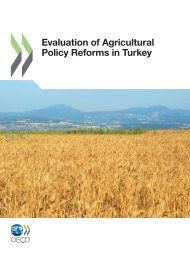
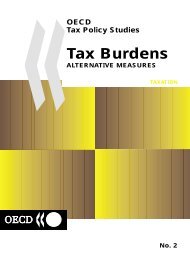

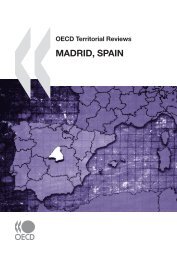



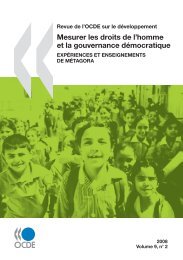
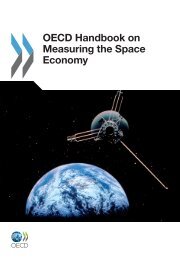

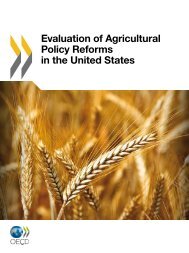
![CQE=U]^\]Z: KAZAKHSTAN - OECD Online Bookshop](https://img.yumpu.com/3915768/1/190x253/cqeuz-kazakhstan-oecd-online-bookshop.jpg?quality=85)